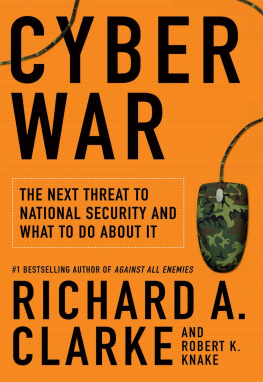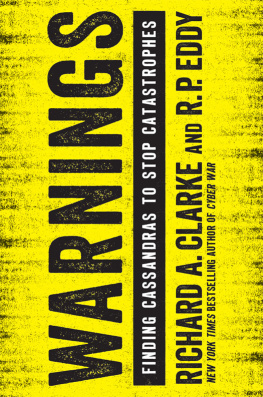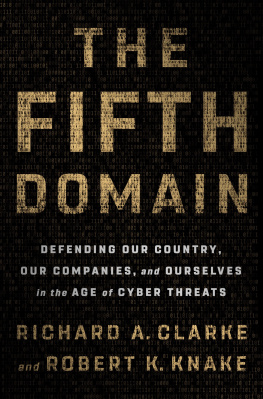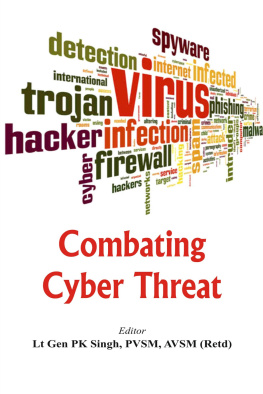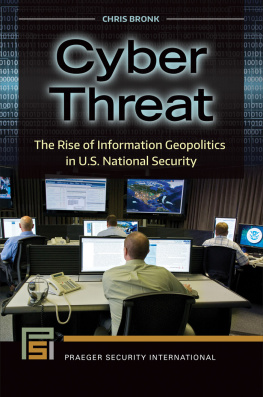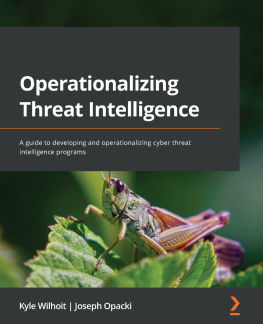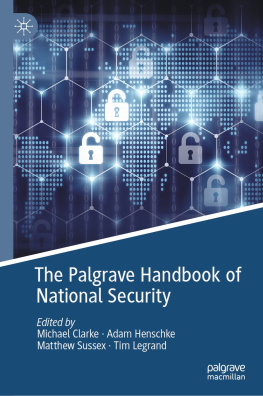Richard A. Clarke - Cyber War: The Next Threat to National Security and What to Do About It
Here you can read online Richard A. Clarke - Cyber War: The Next Threat to National Security and What to Do About It full text of the book (entire story) in english for free. Download pdf and epub, get meaning, cover and reviews about this ebook. year: 2010, publisher: HarperCollins, genre: History. Description of the work, (preface) as well as reviews are available. Best literature library LitArk.com created for fans of good reading and offers a wide selection of genres:
Romance novel
Science fiction
Adventure
Detective
Science
History
Home and family
Prose
Art
Politics
Computer
Non-fiction
Religion
Business
Children
Humor
Choose a favorite category and find really read worthwhile books. Enjoy immersion in the world of imagination, feel the emotions of the characters or learn something new for yourself, make an fascinating discovery.
- Book:Cyber War: The Next Threat to National Security and What to Do About It
- Author:
- Publisher:HarperCollins
- Genre:
- Year:2010
- Rating:4 / 5
- Favourites:Add to favourites
- Your mark:
- 80
- 1
- 2
- 3
- 4
- 5
Cyber War: The Next Threat to National Security and What to Do About It: summary, description and annotation
We offer to read an annotation, description, summary or preface (depends on what the author of the book "Cyber War: The Next Threat to National Security and What to Do About It" wrote himself). If you haven't found the necessary information about the book — write in the comments, we will try to find it.
Cyber War: The Next Threat to National Security and What to Do About It — read online for free the complete book (whole text) full work
Below is the text of the book, divided by pages. System saving the place of the last page read, allows you to conveniently read the book "Cyber War: The Next Threat to National Security and What to Do About It" online for free, without having to search again every time where you left off. Put a bookmark, and you can go to the page where you finished reading at any time.
Font size:
Interval:
Bookmark:
To the late William Weed Kaufmann, who taught me and so many
others how to analyze national security issues.
R ICHARD C LARKE
To my wife, Elizabeth, whose support knows no bounds. And for our
daughter, Charlotte, may you grow up in a more peaceful century.
R OB K NAKE
I t was in the depths of a gray and chill Washington winter. On a side street not far from Dupont Circle, in a brownstone filled with electric guitars and an eclectic collection of art, we gathered to remember the man who had taught us how to analyze issues of war and defense. Two dozen of his former students, now mostly in their fifties, drank toasts that February night in 2009 to Professor William W. Kaufmann, who had died weeks earlier at age ninety. Bill, as everyone referred to him that night, had taught defense analysis and strategic nuclear weapons policy at MIT for decades, and later at Harvard and the Brookings Institution. Generations of civilian and military experts had earned that title by passing through his courses. Bill was also an advisor to six Secretaries of Defense, sitting in the front office on the E Ring of the Pentagon. He shuttled between Boston and Washington every week for decades.
Behind his back, some of us had referred to Professor Kaufmann as Yoda, in part because of a vague physical and stylistic resemblance, but chiefly because we thought of him as our Jedi master, the man who understood the workings of the Force and tried to teach them to us. As an analyst and advisor, Bill had been one of a handful of civilians who had created the framework of strategic nuclear war doctrine in the late 1950s and early 1960s. They had walked the United States back from a nuclear strategy that had called for the United States to go first in a nuclear war, to use all of its nuclear weapons in one massive attack, and to destroy hundreds of cities in Europe and Asia. Bill and his colleagues had probably prevented a global nuclear war and had made strategic arms control possible. Our conversation that night, lubricated by the same martinis Bill used to drink with us, turned to the future. What could we do to honor the memory of William W. Kaufmann and the other strategists of the second half of the twentieth century? We could, someone suggested, continue their work, use what Bill had taught us, ask the tough analytical questions about todays strategy. Another at the table suggested that today is very different from the 1950s, when nuclear weapons were being deployed without a thoughtful strategy; strategies are well developed today.
But is it such a different time? In the first decade of the twenty-first century, the U.S. developed and systematically deployed a new type of weapon, based on our new technologies, and we did so without a thoughtful strategy. We created a new military command to conduct a new kind of high-tech war, without public debate, media discussion, serious congressional oversight, academic analysis, or international dialogue. Perhaps, then, we are at a time with some striking similarities to the 1950s. Perhaps, then, we need to stimulate learned discussion and rigorous analysis about that new kind of weapon, that new kind of war.
It is cyberspace and war in it about which I speak. On October 1, 2009, a general took charge of the new U.S. Cyber Command, a military organization with the mission to use information technology and the Internet as a weapon. Similar commands exist in Russia, China, and a score of other nations. These military and intelligence organizations are preparing the cyber battlefield with things called logic bombs and trapdoors, placing virtual explosives in other countries in peacetime. Given the unique nature of cyber war, there may be incentives to go first. The most likely targets are civilian in nature. The speed at which thousands of targets can be hit, almost anywhere in the world, brings with it the prospect of highly volatile crises. The force that prevented nuclear war, deterrence, does not work well in cyber war. The entire phenomenon of cyber war is shrouded in such government secrecy that it makes the Cold War look like a time of openness and transparency. The biggest secret in the world about cyber war may be that at the very same time the U.S. prepares for offensive cyber war, it is continuing policies that make it impossible to defend the nation effectively from cyber attack.
A nation that has invented the new technology, and the tactics to use it, may not be the victor, if its own military is mired in the ways of the past, overcome by inertia, overconfident in the weapons they have grown to love and consider supreme. The originator of the new offensive weaponry may be the loser unless it has also figured out how to defend against the weapon it has shown to the rest of the world. Thus, even though the American colonel Billy Mitchell was the first to understand the ability of small aircraft to sink mighty battleships, it was the Japanese Imperial Navy that acted on that understanding, and came close to defeating the Americans in the Pacific in World War II. It was Britain that first developed the tank, and a French colonel, Charles de Gaulle, who devised the tactics of rapid attack with massed tanks, supported by air and artillery. Yet it was a recently defeated Germany that perfected the tank in the 1930s and first employed de Gaulles tactics, which later became known as blitzkrieg. (As recently as 1990, and again in 2003, the U.S. military went to war with an updated version of the seventy-year-old blitzkrieg tactic: fast movement of heavy tank units, supported by aircraft.)
Warmed by the camaraderie of my fellow ex-students, and by the martinis, I left the brownstone and wandered out into that cold night, pondering this irony of history, and making a commitment to myself, and to Bill, that I would try to stimulate open, public analysis and discussion of cyber-war strategy before we stumbled into such a conflict. This book is the down payment on that commitment. I knew that I needed a younger partner to join me in trying to understand the military and technological implications of cyber war well enough to produce this book. Different generations think of cyberspace differently. For me, looking at my sixtieth birthday in 2010, cyberspace is something that I saw gradually creep up around me. It happened after I had already had a career dealing with nuclear weapons, in a bipolar world. I became the first Special Advisor to the President for Cyber Security in 2001, but my views of cyber war are colored by my background in nuclear strategy and espionage.
Rob Knake was thirty when he and I wrote this book. For his generation, the Internet and cyberspace are as natural as air and water. Robs career has focused on homeland security and the transnational threats of the twenty-first century. We have worked together at Harvards Kennedy School of Government, at Good Harbor Consulting, and on the Obama for America campaign. In 2009, Rob won the prestigious International Affairs Fellowship at the Council on Foreign Relations with an appointment to study cyber war. We decided to use the first-person singular in the text because many times I will be discussing my personal experiences with government, with the information-technology industry, and with Washingtons clans, but the research, writing, and concept development were a joint enterprise. We have wandered around Washington and other parts of this country together in search of answers to the many questions surrounding cyber war. Many people have helped us in that search, some of them wishing to remain unnamed in this book because of their past or present associations. We had spent long hours discussing, debating, and arguing until we found a synthesis of our views. Rob and I both agree that cyber war is not some victimless, clean, new kind of war that we should embrace. Nor is it some kind of secret weapon that we need to keep hidden from the daylight and from the public. For it is the public, the civilian population of the United States and the publicly owned corporations that run our key national systems, that are likely to suffer in a cyber war.
Font size:
Interval:
Bookmark:
Similar books «Cyber War: The Next Threat to National Security and What to Do About It»
Look at similar books to Cyber War: The Next Threat to National Security and What to Do About It. We have selected literature similar in name and meaning in the hope of providing readers with more options to find new, interesting, not yet read works.
Discussion, reviews of the book Cyber War: The Next Threat to National Security and What to Do About It and just readers' own opinions. Leave your comments, write what you think about the work, its meaning or the main characters. Specify what exactly you liked and what you didn't like, and why you think so.

